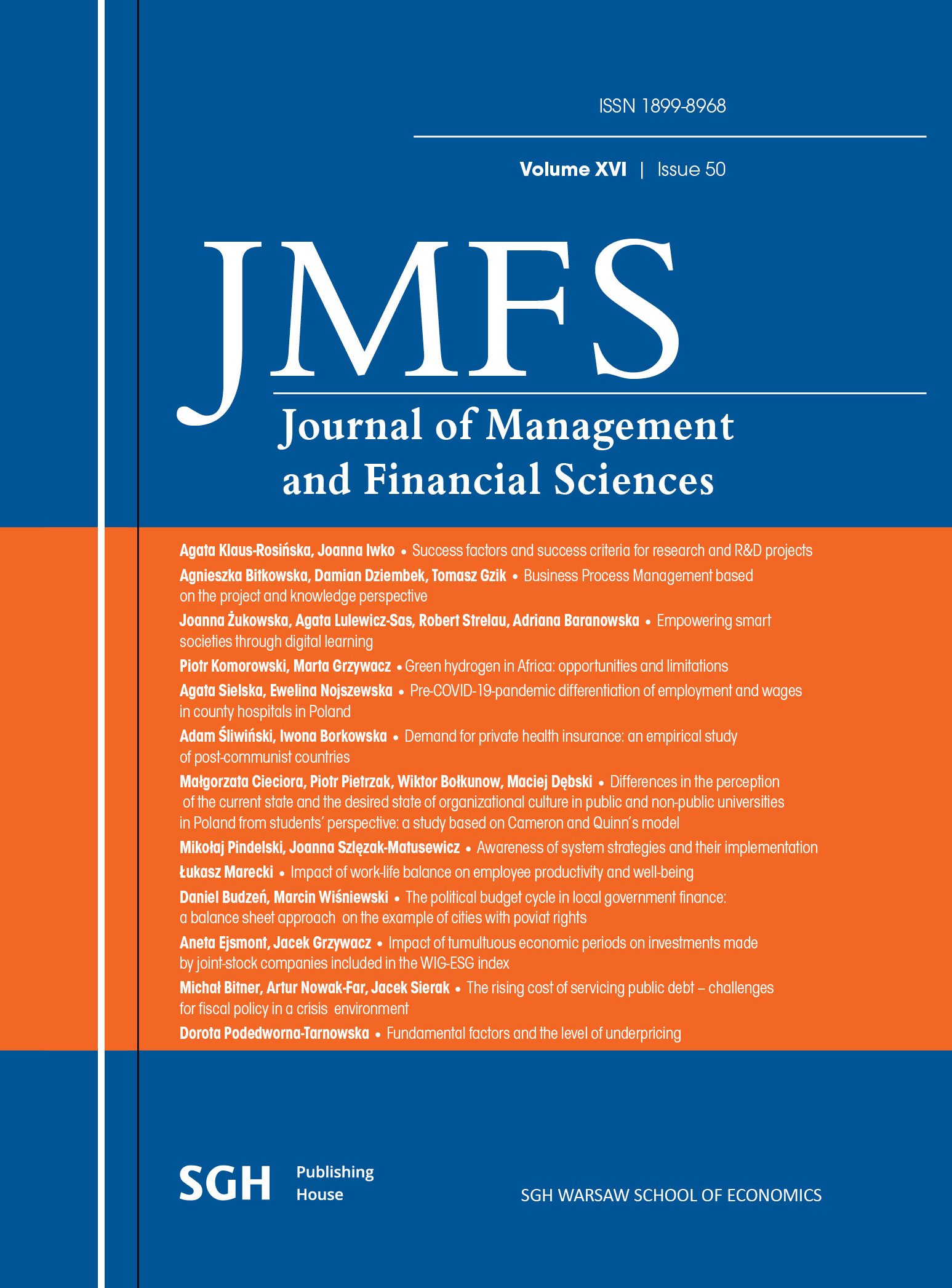Business Process Management based on the project and knowledge perspective
Main Article Content
Abstract
New technological solutions require an organization to adapt constantly to changes in a dynamic environment. More and more enterprises implement Business Process Management, both at the strategic and operational levels, taking into account the project perspective based on knowledge resources. The aim of the article is to show the usefulness of building links between processes and projects based on knowledge resources in dynamic changeable technological circumstances based on research conducted in Poland. The approach guides Business Process Management activities by supporting organizations in identifying opportunities from business and technology trends and integrating them into business processes with novel value propositions.
Downloads
Article Details

This work is licensed under a Creative Commons Attribution 4.0 International License.
References
Bajdor, P., Dziembek, D. (2023). Impact of the COVID-19 Pandemic on the Adaptation and Development of Cloud Computing Solutions in Enterprises in Poland. In: A. R. da Silva, M. M. da Silva, J. Estima, C. Barry, M. Lang, H. Linger, & C. Schneider (Eds.), Information Systems Development, Organizational Aspects and Societal Trends (ISD2023 Proceedings). Lisbon, Portugal: Instituto Superior Técnico. ISBN: 978-989-33-5509-1, https://doi.org/10.62036/ISD.2023.35
Beerepoot I., Di Ciccio C., Reijers H. A., et al. (2023). The biggest business process management problems to solve before we die. Computers in Industry, 146 (103837).
Berniak‐Woźny J., Szelągowski, M, (2021). Towards the assessment of business process knowledge intensity – a systematic literature review. Business Process Management Journal, 28 (1), pp. 40–61, https://doi.org/10.1108/BPMJ-01-2021-0012
Bitkowska, A. (2020). The Relationship between Business Process Management and Knowledge Management – Selected Aspects from a Study of Companies in Poland. Journal of Entrepreneurship, Management and Innovation, 16 (1), pp. 169–193., https://doi.org/10.7341/20201616
Bitkowska, A.. (2019). Od klasycznego do zintegrowanego zarządzania procesowego w organizacjach. Wydawnictwo CH Beck.
Brajer-Marczak, R., Nowosielski, S. (2016). Zdolność organizacji do ciągłego doskonalenia procesów. In: A. Bitkowska, E. Weiss (Eds.). Wielowymiarowość podejścia procesowego w zarządzaniu. Warszawa: Wyższa Szkoła Finansów i Zarządzania w Warszawie.
Business Process Management Study 2023 (2023). Institute of Business Information Technology at the ZHAW, BOC Group.
Business Process Management-Study (2017). https://www.bearingpoint.com/en/our-success/insights/bpm-study-2017
Bukłaha, E. Cabała, P. (2022). Przydatność wybranych koncepcji zarządzania zmianą w świecie VUCA. Studia i Prace Kolegium Zarządzania i Finansów, (186), pp. 119–131, https://doi. org/10.33119/SIP.2022.186.8
Dabaghkashani, Zeinab, Hajiheydari, N., Haghighinasab, M. (2012). A Success Model for Business Process Management Implementation. International Journal of Information and Electronics Engineering, 2 (5), pp. 725–729.
Di Ciccio, C., Gabryelczyk, R., García-Bañuelos, L., Hernaus, T., Hull, R., Indihar-Štemberger, M., Ko, A., Stables, M. (Eds.) (2019). Business Process Management: Blockchain and Central and Eastern Europe Forum – BPM 2019 Blockchain and CEE Forum, Proceedings. Cham: Springer.
El Ghalbzouri, H., El Bouhdidi, J. (2022). Integrating Business Intelligence with Cloud Computing: State of the Art and Fundamental Concepts. Smart Innovation, Systems and Technologies, 237, https://doi.org/10.1007/978-981-16-3637-0_14
Gzik, T. (2023). Zarządzanie procesami biznesowymi z wykorzystaniem chmury obliczeniowej. Warszawa: Difin.
Harmon, P., Garcia, J. (2020). BPTrends State of Business Process Management – 2020 Report, https://www.researchgate.net/publication/343657721_BPTrends_Report_The_State_of_Business_Process_Management_2020
Helbin, T., Van Looy, A. (2021). Is Business Process Management (BPM) Ready for Ambidexterity? Conceptualization, Implementation Guidelines and Research Agenda. Sustainability, 13, (1906), https://doi.org/10.3390/su13041906
Idogawa, J., Bizarrias, F. S., Câmara, R. (2023). Critical success factors for change management in business process management. Business Process Management Journal, 29 (7), pp. 2009–2033, https://doi.org/10.1108/BPMJ-11-2022-0625
Jeston, J., Nelis, J. (2014). Business process management. Practical guidelines to successful implementations. London and New York: Routledge Taylor&Francis Group.
Malinova, M., Mendling, J. (2018). Identifying do’s and don’ts using the integrated business process management framework. Business Process Management Journal, 24 (4), pp. 882–899.
Martínez-Martínez, A., Suárez, L. M. C., Montero, R. S., del Arco, E. A. (2018). Knowledge management as a tool for improving business processes: An action research approach. Journal of Industrial Engineering and Management, 11 (2), pp. 276–289.
McKinsey & Company (2022). Digital Challengerson the next frontier in Central and Eastern Europe, https://www.mckinsey.com/capabilities/mckinsey-digital/our-insights/digital-challengers-on-the-next-frontier-in-central-and-eastern-europe
Mohamad, A. K., Jayakrishnan, M., Yusof, M. M. (2022). Thriving Information System through Business Intelligence Knowledge Management Excellence Framework. Int. J. Electr. Comput. Eng., 12 (1), pp. 506–514, https://doi.org/10.11591/ijece.v12i1
Nowosielski, S. (2017). Procesy i projekty w zarządzaniu zmianą organizacyjną. Prace naukowe Uniwersytetu Ekonomicznego we Wrocławiu, 463.
Paschek, D., Ivascu, L., Draghici, A., (2018). Knowledge Management – The Foundation for a Successful Business Process Management. Procedia-Social and Behavioral Sciences, pp. 182–191, https://doi.org/10.1016/j.sbspro.2018.03.022
Probst, G., Raub, S., Romhardt, K. (2000). Managing Knowledge. London: Wiley.
Rosemann, M.,Vom Brocke, J. (2015). Handbook on Business Process Management 2: Strategic Alignment, Governance, People and Culture. Springer.
Ubaid, A. M., Dweiri, F. T. (2020). Business process management (BPM): terminologies and methodologies unified. International Journal of System Assurance Engineering and Management, 11, pp. 1–19, https://link.springer.com/article/10.1007/s13198-020-00959‑y#citeas
vom Brocke, J., Zelt, S., Schmiedel, T. (2016). On the role of context in business process management. International Journal of Information Management, 36 (3), pp. 486–495, http://dx.doi.org/10.1016/j.ijinfomgt.2015.10.002 0268-4012
Wodecki, A., (2020), Artificial Intelligence in Management. Self-learning and Autonomous Systems as Key Drivers of Value Creation,, Edward Elgar Publishing
Wyrozębski, P. (2014). Zarządzanie wiedzą projektową. Warszawa: Difin.
Zhu, P. (2015). Knowledge Management (KM) vs. Business Process Management (BPM), http://futureofcio.blogspot.de/2013/10/knowledge-management-km-vs-business.html [accessed:18.12.2023].
